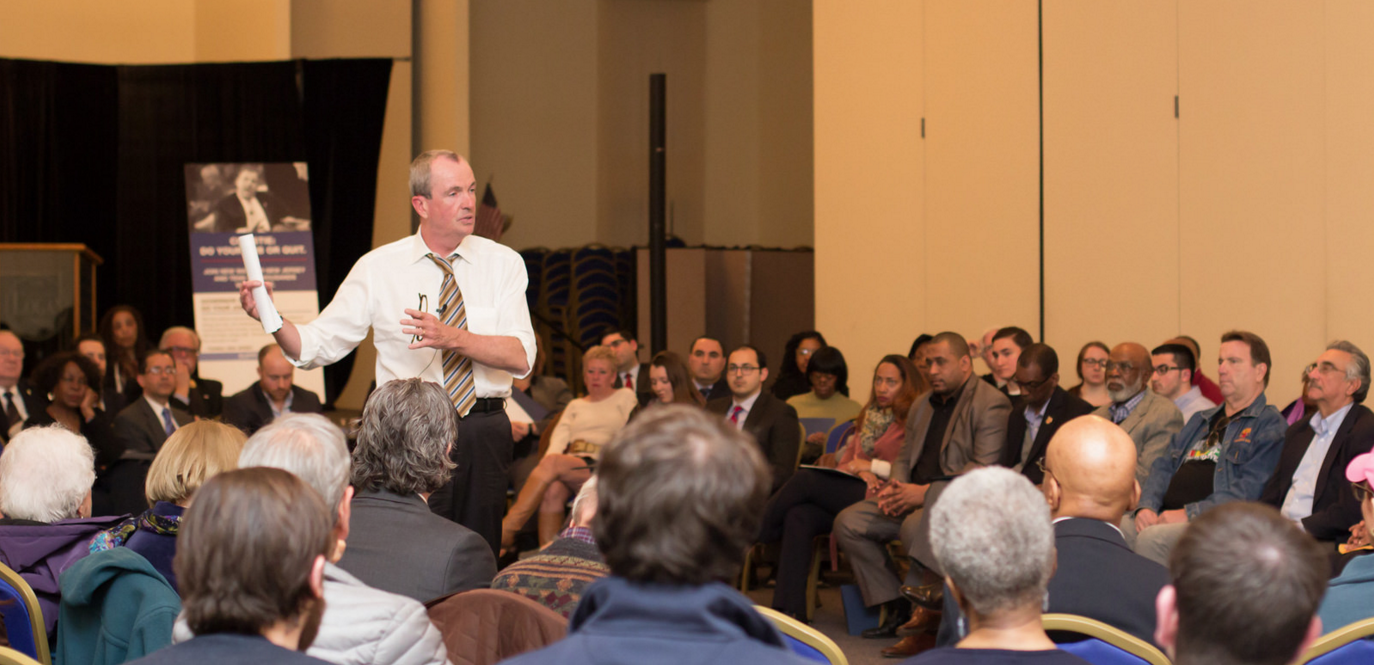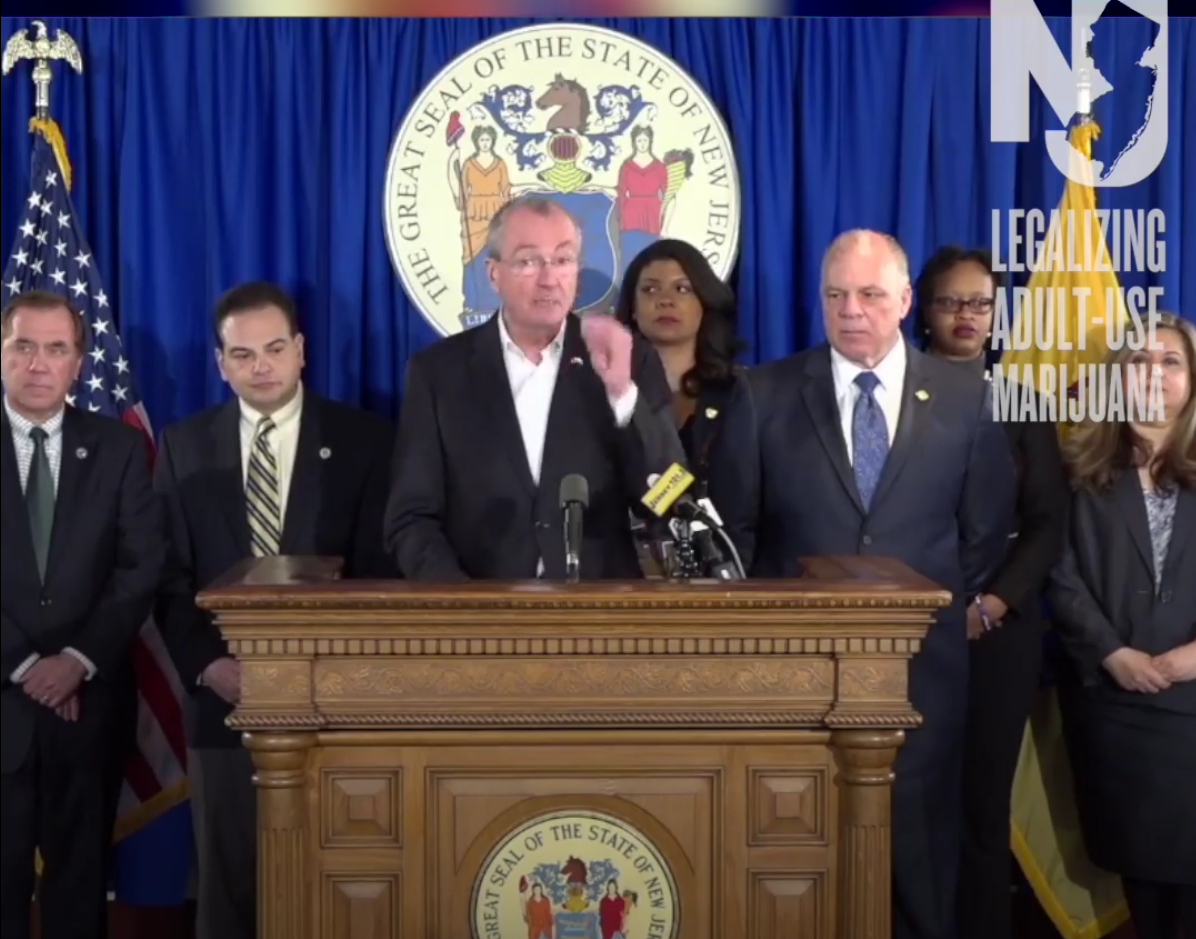
TRENTON—Following the Nov. 5 elections and with two missed opportunities already this year—state legislators are expected to reconsider legislation to legalize adult-use marijuana during the “lame-duck” session between now and mid-January.
If efforts to persuade reluctant legislators do not succeed, Senate President Steve Sweeney said that he would likely hold a vote on putting the issue as a referendum question in November 2020.
Most legislative observers expect a referendum vote to easily pass.
Passage odds “50-50”
Sweeney told reporters recently he felt chances for legalization succeeding was “50-50” during lame-duck negotiations.
Previously in March, lawmakers and the governor agreed to a $42 per-ounce adult-use tax rate and a commission to regulate the new legal marijuana industry.
But while the proposed legalization bill was said to likely pass the Assembly easily—based on Sweeney’s polling—it appeared to lack the 21 votes necessary to pass in the Senate. The same road block occurred in March.
The Assembly has 80 members; the Senate has 40 members.
Another sticking point earlier this year was expungement of past low-level cannabis convictions—which several senators opposing legalization had pushed for even while legalization efforts have stalled.
Although Sweeney said he supports the legislation to decriminalize, it was unclear if he would support a separate bill to decriminalize low-level marijuana possession.
In an Op-Ed published in late September, Democratic State Senator Ronald Rice (D-28) said “New Jersey’s recent yearlong travesty of trying to force recreational marijuana legalization through the Legislature felt a lot like a Three-card-Monte swindle. Maybe you’ll agree,” wrote Rice, noting the Legislature could still pass a decriminalization bill apart from any legalization effort and has failed to do so.
‘An elaborate hustle’
“I hate to be suspicious of the marijuana industry investors lurking as shills in the background, but I realize this whole exercise had nothing to do with social justice or lowering property taxes. Maybe it was only an elaborate hustle so that some group makes money. Maybe it was just a series of fake card tosses covering something behind the scenes,” wrote Rice.
He said though officials said legalization would free up $147 million the state spends annually to arrest, convict and jail low-amount drug offenders, most legislators appear to have no interest in decriminalizing marijuana apart from efforts to legalize marijuana, said Rice. Critics of one decriminalization bill under consideration opposed a provision expunging convictions for possession of up to five pounds of marijuana, looking to reduce that amount.
‘Not a probability’
A representative from the state’s leading municipal government organization said based on his knowledge of New Jersey’s legislative process, adult-use marijuana legalization “is a distinct possibility but not a probability.”
Michael Cerra, deputy executive director of the State League of Municipalities, said “there’s a recognition that this is a personal, moral issue to some [legislators],” and noted Sweeney’s assessment for legalization at 50-50.
Cerra said with a medical marijuana bill already passed in May that calls for dozens of medical dispensaries statewide, and separate efforts for a decriminalization bill, he felt the Senate vote “may have inched closer” for approval.
He said he agreed with Sweeney’s contention that every change made in the legalization bill could lose or gain a vote.
“It’s kind of nip and tuck at this point…but the fallback is a vote on a [legalization] referendum,” said Cerra.
He said another concern was making sure no packaging or marketing of cannabis products appealed to or targeted underage consumers.
He said a panel featuring a mayor from Eastampton, Mass., Colleen Mahr of Fanwood, and Reed Gusciora of Trenton will discuss marijuana pros and cons at the League conference (scheduled Nov. 19-21 in Atlantic City). Marijuana was legalized this year in Massachusetts.
Vaping a factor
Cerra said one new wrinkle in the marijuana legalization debate is vaping, which was less of a factor in March when initial legislative efforts occurred.
“It’s really hit the public consciousness lately,” he noted.
He said the public health crisis associated with vaping in New Jersey and nationwide has implicated vape products containing THC, marijuana’s psychoactive component, although no causal link has yet been established.
Many vaping products linked to illnesses and deaths appear to be unregulated black market or online sources, not purchased via regulated medical cannabis dispensaries.
He said since March efforts at legalization failed, he’s heard from mayors and public officials for and against recreational marijuana.
“It [legalization] cuts both ways, which is why we haven’t taken a position on legalization,” said Cerra.
He said, if passed, the legislation offers towns 180 days to “opt-out” of any of four marijuana enterprises.
The legislation allows towns to opt-out of all four marijuana licenses, but towns can also opt-in at any time by simply passing an ordinance, he said.
He said local zoning still prevails under legalization legislation.
“You still have the ability to control your own fate,” he said. Also, Cerra said for towns interested in hosting a future marijuana enterprise, a local “transfer tax” can be imposed to generate revenues.
Cerra said the bill allows towns to charge 3% of sale receipts from a cannabis retailer, 2% of sale receipts from a grower, cultivator or processor, and 1% of sale receipts from a cannabis wholesaler.
Should a municipality host multiple cannabis enterprises, tax receipts could increase to at least 8% of sales receipts—which are separate from the state’s $42 per ounce tax.
‘Local opposition’
“There’s local opposition in your area,” Cerra said, speaking of mayors in Bergen County he’s spoken with in 2019.
He said at an April forum he attended in Hackensack, most mayors and many public officials opposed legalizing adult-use marijuana and all opposed local dispensaries.
Also, over the last two years, every mayor and police chief surveyed by Northern Valley Press has consistently opposed legalization and adult-use marijuana retail outlets.
Many towns have passed ordinances or resolutions banning such shops locally and a few have banned or restricted vaping establishments.
Regulated vaping products—such as Juul and Blu vape cartridges and e-cigarettes—remain available at most local convenience shops.
‘565 different reasons’
Cerra said “there’s 565 municipalities making their own decisions for 565 different reasons.”
He said the League will assist towns to opt-in or opt-out of the state’s legal marijuana industry—if and when it is approved. He predicted initially many towns will opt-out of any cannabis enterprise “and give it a year and then revisit it.”
He said while adult-use legalization may occur, he does not foresee a rush by entrepreneurs to open marijuana shops. Also “every community is kind of unique” regarding if and where a facility could be located.
He said legalization should provide revenues and training for new Drug Recognition Experts (DREs) to test impaired cannabis consumers.
Moreover, he said, a California company is currently marketing a cannabis “breathalyzer” in pre-market trials, possibly offering local police a new tool for identifying and catching drugged drivers.
“I don’t see a domino effect happening anywhere statewide regarding opening marijuana establishments” after legalization, he added. Cerra said too many questions and reservations exist among town officials about negative impacts of legal marijuana.
Democratic Assemblywoman Valerie Vainieri Huttle (D-37) said that she did not support legalization due to a lack of scientific evidence.
“Although public opinion and support for the legalization of recreational marijuana has grown, I don’t believe our scientific evidence has,” Vainieri Huttle told a news outlet in March.
“Groups such as the American Academy of Pediatrics [AAP] remain in opposition as well as health care professionals pointing to concerns regarding cognitive effects on the brain and the long term implications of marijuana use from a young age.”
Regional states’ action
On Oct. 17, governors from several northeastern states, including New Jersey, said they would work together to regulate marijuana and vaping on a regional basis, mentioning possible regional restrictions on flavored vaping products.
“In New Jersey, we are committed to conquering the public health challenge of vaping and advancing marijuana legislation. These actions will be strengthened and magnified when we know there is a similar strategic approach in New York, Connecticut, Pennsylvania, and other states,” said Gov. Phil Murphy.
“Our impact is much greater when we break out of our own silos as individual states and collaborate on the tough issues plaguing our region and nation. Together, we can ensure that these challenges are met with thoughtful, comprehensive action for those who live and work in our region,” Murphy added.
Murphy said the group came up with initial guidelines to regulate legalized, recreational marijuana, such as approving parallel policies for THC content, edibles, advertising and taxes in order to discourage consumers from turning to illegal suppliers.
Also, racial disparities in arrest rates for African Americans versus whites have drawn attention to decriminalization and expungement as necessary before legalization is approved.
“We’ve got a shocking gap between persons incarcerated in our system along racial lines, and it’s almost entirely due to low-end marijuana offenses,” he said.
‘Screams out at us’
“Putting aside all of the other factors that come into the cannabis discussion, the social justice, at least in New Jersey, screams out at us and it’s why we’ve come to the table with such passion,” Murphy said in a statement.
The regional effort among states addresses areas such as market regulation, public health, public safety and enforcement, and vaping.
A Feb. 2019 Monmouth University poll of about 600 New Jerseyans found nearly 70 percent of state residents believed legalizing marijuana would boost the state’s economy but nearly 30 percent felt legalization would lead to an increase in other drug crimes.
However, 74 percent supported giving people convicted of possessing small amounts of marijuana a chance to clear their records if pot is legalized.



